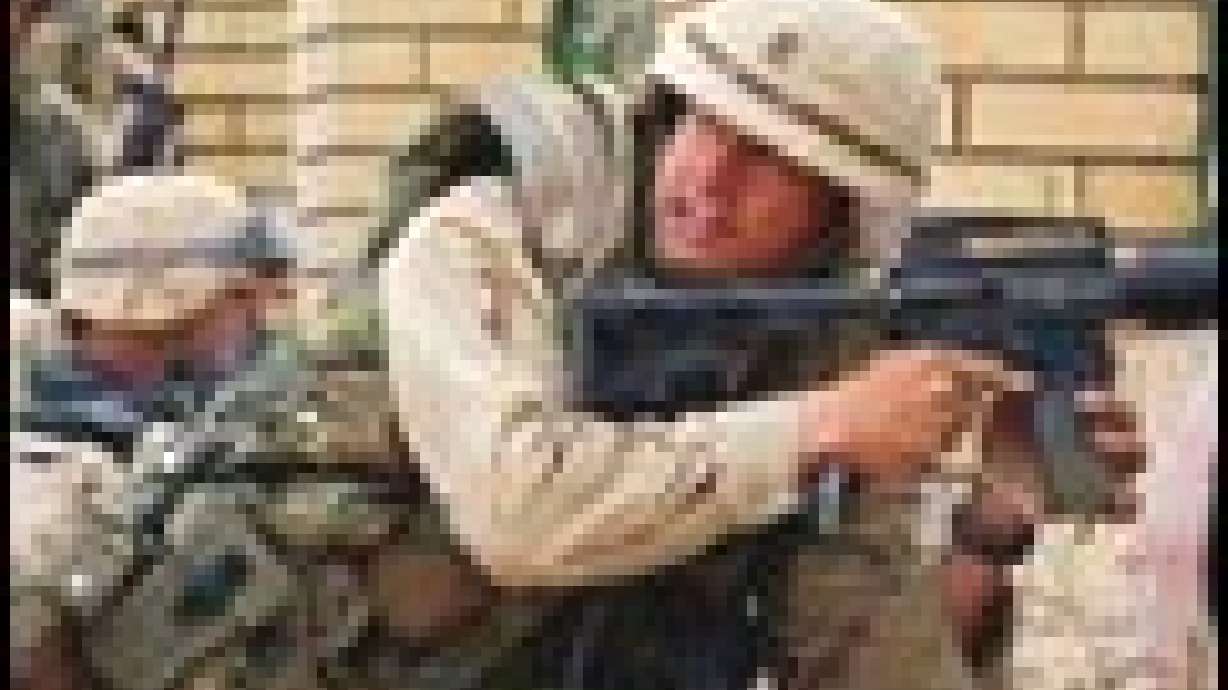Estimated read time: 4-5 minutes
This archived news story is available only for your personal, non-commercial use. Information in the story may be outdated or superseded by additional information. Reading or replaying the story in its archived form does not constitute a republication of the story.
AIN LALIN, Iraq (AP) -- American troops swooped into a remote Iraqi village aboard Black Hawk helicopters Monday in search of a member of Saddam Hussein's inner circle. They couldn't find him, but rounded up about 70 suspects.
North of Baghdad, meanwhile, three American soldiers were wounded in a grenade attack, a day after a U.S. military policeman was killed in a bombing.
The main target of the raid in Ain Lalin was a former regime member who is on the U.S. list of 55 most-wanted Iraqis and who has gained growing importance as the coalition thins the ranks of Saddam's inner circle, said Lt. Col. Mark Young. He would not identify the target.
About 70 men were detained, and some were still being questioned late Monday, 4th Infantry spokeswoman Maj. Josslyn Aberle said.
Young said the raid sent a powerful message.
"Even if we didn't get the guy, it shows there is nowhere that the coalition can't go," Young said as soldiers searched homes and vehicles leaving the village, 60 miles northeast of Baghdad. They encountered no resistance.
"If I was Saddam Hussein, I would be sleeping with one eye open and probably be a nervous wreck by now," he said. "He's got to hear footsteps behind him."
Three soldiers from the 4th Infantry Division were wounded Monday after guerrillas ambushed their patrol in Shumayt, just north of Tikrit, spokesman Lt. Col. Bill MacDonald said. All three were in stable condition.
The killing of the U.S. military policeman occurred Sunday night at an Iraqi police station near Baqouba, 40 miles northeast of the capital.
"We had a suspicious package dropped off at the Baqouba police headquarters and an MP with the task force went out to investigate it," Aberle said.
The MP was seriously wounded in the blast and evacuated to a military hospital, but later died of his wounds, she said. Two other MPs were wounded, but were in stable condition on Monday, she said.
The death brought to 57 the number of U.S. troops killed in action since May 1, when President Bush declared major combat over.
In central Baghdad, two grenades were thrown from a car at U.S. military police manning a checkpoint Monday, witnesses said. The soldiers returned fire, killing one Iraqi, the witnesses said. No U.S. casualties were reported.
Also Monday, the president of the U.S.-picked Governing Council said the interim government had postponed appointing Cabinet ministers for three weeks. Ibrahim al-Jaafari, council president for August, said a 25-member committee will be formed soon to choose the constitutional assembly. He gave no dates.
Calm returned to Basra on Monday after two days of riots, during which Iraqis hurled rocks and bricks at British troops to protest fuel, electricity and water shortages in the southern city.
Residents have complained that in the last week much of the city has had less than three hours of power a day, little or no water supplies and a shortage of fuel.
British military spokesman Capt. Hisham Halawi said coalition authorities began restoring electricity to the city late Sunday and were bringing 6.6 million gallons of fuel to Basra to alleviate shortages.
But some motorists were still forced to line up for hours and warned that unless the situation improves, they may rise up again.
"When the people get what they want they are peaceful, but if they don't, the British will see something else," said Nors Mhibs, a 60-year-old driver, who had been waiting for hours at a gas station in central Basra.
"I have six sons, I have six guns and I have an RPG (rocket-propelled grenade). I can make trouble any time."
British troops deployed at the gas station as scores of cars waited for a fuel tanker to arrive.
Iain Pickard, the coalition spokesman in Basra, blamed the problems on the region's poor infrastructure, oil smugglers and saboteurs who have destroyed electricity lines and pylons.
In Washington, the Army said Monday that two more soldiers overseas have come down with serious pneumonia, bringing the unexplained cases to 17. Some cases are so serious the patients had to be put on ventilators and flown to Europe.
Officials said last week that cases involved troops in Afghanistan, Iraq, Uzbekistan, Qatar and elsewhere. Monday's statement did not say where the new cases happened, and no one was available to comment.
(Copyright 2003 by The Associated Press. All Rights Reserved.)








